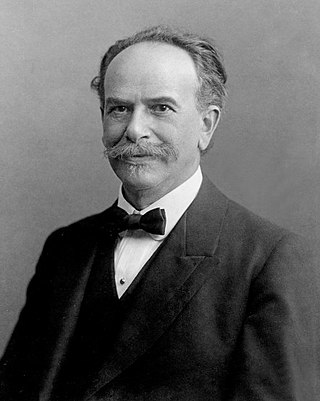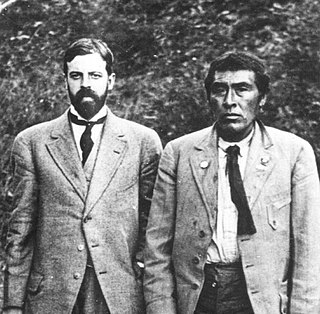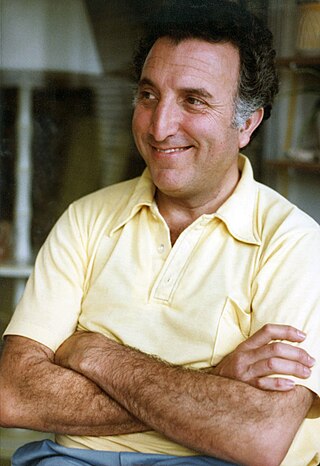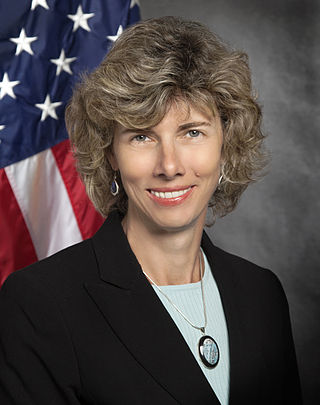Related Research Articles

Anthropology is the scientific study of humanity, concerned with human behavior, human biology, cultures, societies, and linguistics, in both the present and past, including past human species. Social anthropology studies patterns of behavior, while cultural anthropology studies cultural meaning, including norms and values. A portmanteau term sociocultural anthropology is commonly used today. Linguistic anthropology studies how language influences social life. Biological or physical anthropology studies the biological development of humans.

Franz Uri Boas was a German-American anthropologist and a pioneer of modern anthropology who has been called the "Father of American Anthropology". His work is associated with the movements known as historical particularism and cultural relativism.

Margaret Mead was an American cultural anthropologist who featured frequently as an author and speaker in the mass media during the 1960s and the 1970s.

A nuclear weapon is an explosive device that derives its destructive force from nuclear reactions, either fission or a combination of fission and fusion reactions, producing a nuclear explosion. Both bomb types release large quantities of energy from relatively small amounts of matter.

Alfred Louis Kroeber was an American cultural anthropologist. He received his PhD under Franz Boas at Columbia University in 1901, the first doctorate in anthropology awarded by Columbia. He was also the first professor appointed to the Department of Anthropology at the University of California, Berkeley. He played an integral role in the early days of its Museum of Anthropology, where he served as director from 1909 through 1947. Kroeber provided detailed information about Ishi, the last surviving member of the Yahi people, whom he studied over a period of years. He was the father of the acclaimed novelist, poet, and writer of short stories Ursula K. Le Guin.

Montague Francis Ashley-Montagu — born Israel Ehrenberg — was a British-American anthropologist who popularized the study of topics such as race and gender and their relation to politics and development. He was the rapporteur, in 1950, for the UNESCO "statement on race".
Decapitation is a military strategy aimed at removing the leadership or command and control of a hostile government or group. The strategy of shattering or defeating an enemy by eliminating its military and political leadership has long been utilized in warfare.

Homi Jehangir Bhabha, FNI, FASc, FRS, Hon.FRSE was an Indian nuclear physicist who is widely credited as the "father of the Indian nuclear programme". He was the founding director and professor of physics at the Tata Institute of Fundamental Research (TIFR), as well as the founding director of the Atomic Energy Establishment, Trombay (AEET) which was renamed the Bhabha Atomic Research Centre in his honour. TIFR and AEET served as the cornerstone of the Indian nuclear energy and weapons programme. He was the first chairman of the Indian Atomic Energy Commission and secretary of the Department of Atomic Energy. By supporting space science projects which initially derived their funding from the AEC, he played an important role in the birth of the Indian space programme.

Since their public debut in August 1945, nuclear weapons and their potential effects have been a recurring motif in popular culture, to the extent that the decades of the Cold War are often referred to as the "atomic age".

Laura Nader is an American anthropologist. She has been a Professor of Anthropology at the University of California, Berkeley since 1960. She was the first woman to receive a tenure-track position in the department. She is also the older sister of U.S. activist, consumer advocate, and frequent third-party candidate Ralph Nader, and the younger sister of community advocate Shafeek Nader and social scientist Claire Nader.
Theodore C. Bestor was a professor of anthropology and Japanese studies at Harvard University. He was the president of the Association for Asian Studies in 2012. In 2018, he resigned as director from the Reischauer Institute following an investigation by Harvard officials that found he committed two counts of sexual misconduct.
George W. Stocking Jr. was a German-born American scholar noted for his scholarship on the history of anthropology.

David John Kilcullen FRGS is an Australian author, strategist, and counterinsurgency expert who is currently the non-executive chairman of Caerus Associates, a strategy and design consulting firm that he founded. He is a professor at Arizona State University and at University of New South Wales, Canberra.
The Human Terrain System (HTS) was a United States Army, Training and Doctrine Command (TRADOC) support program employing personnel from the social science disciplines – such as archaeology, anthropology, sociology, political science, historians, regional studies, and linguistics – to provide military commanders and staff with an understanding of the local population in the regions in which they are deployed.

George Emanuel Marcus is an American professor of anthropology at the University of California, Irvine who focuses on the anthropology of elites.

Melvin Lawrence Ember was an American cultural anthropologist and cross-cultural researcher with wide-ranging interests who combined an active research career with writing for nonprofessionals.

Allison M. Macfarlane directs the School of Public Policy and Global Affairs at the University of British Columbia. She is the former director of the Institute for International Science and Technology Policy at George Washington University, where she was Professor of Science Policy and International Affairs. She was the chairman of the United States Nuclear Regulatory Commission (NRC) from July 9, 2012, to December 31, 2014.
This bibliography of anthropology lists some notable publications in the field of anthropology, including its various subfields. It is not comprehensive and continues to be developed. It also includes a number of works that are not by anthropologists but are relevant to the field, such as literary theory, sociology, psychology, and philosophical anthropology.

Nuclear ethics is a cross-disciplinary field of academic and policy-relevant study in which the problems associated with nuclear warfare, nuclear deterrence, nuclear arms control, nuclear disarmament, or nuclear energy are examined through one or more ethical or moral theories or frameworks. In contemporary security studies, the problems of nuclear warfare, deterrence, proliferation, and so forth are often understood strictly in political, strategic, or military terms. In the study of international organizations and law, however, these problems are also understood in legal terms. Nuclear ethics assumes that the very real possibilities of human extinction, mass human destruction, or mass environmental damage which could result from nuclear warfare are deep ethical or moral problems. Specifically, it assumes that the outcomes of human extinction, mass human destruction, or environmental damage count as moral evils. Another area of inquiry concerns future generations and the burden that nuclear waste and pollution imposes on them. Some scholars have concluded that it is therefore morally wrong to act in ways that produce these outcomes, which means it is morally wrong to engage in nuclear warfare.
Catherine Lowe Besteman is an Italian American abolitionist educator at Colby College, where she holds the Francis F. Bartlett and Ruth K. Bartlett Chair in Anthropology. Her research and practice engage the public humanities to explore abolitionist possibilities in Maine. She has taught at that institution since 1994.
References
- ↑ "Hugh Gusterson - The Department of Anthropology - The George Washington University". anthropology.columbian.gwu.edu.
- ↑ GUSTERSON, HUGH (29 July 2001). "If U.S. Dumps Test Ban Treaty, China Will Rejoice" – via LA Times.
- ↑ Intern (29 June 2012). "The Auditors". Boston Review.
- ↑ "McDonnell should beware of donors with gifts". Washington Post.
- ↑ Gusterson, Hugh (23 September 2012). "Want to Change Academic Publishing? Just Say No" – via The Chronicle of Higher Education.
- ↑ "When Professors Go to War". 21 July 2008.
- ↑ "Hugh Gusterson (Biography)". American Scientist Online. Sigma Xi, The Scientific Research Society. Retrieved 30 December 2010.
- ↑ "Columnist: Hugh Gusterson". Bulletin of the Atomic Scientists. thebulletin.org. Retrieved 30 December 2010.
- ↑ https://caph.gmu.edu/assets/caph/TeenDrinkingCulturesFinalReport_2010.pdf [ bare URL PDF ]
- ↑ "Drone".
- ↑ "Network of Concerned Anthropologists" . Retrieved 30 September 2017.